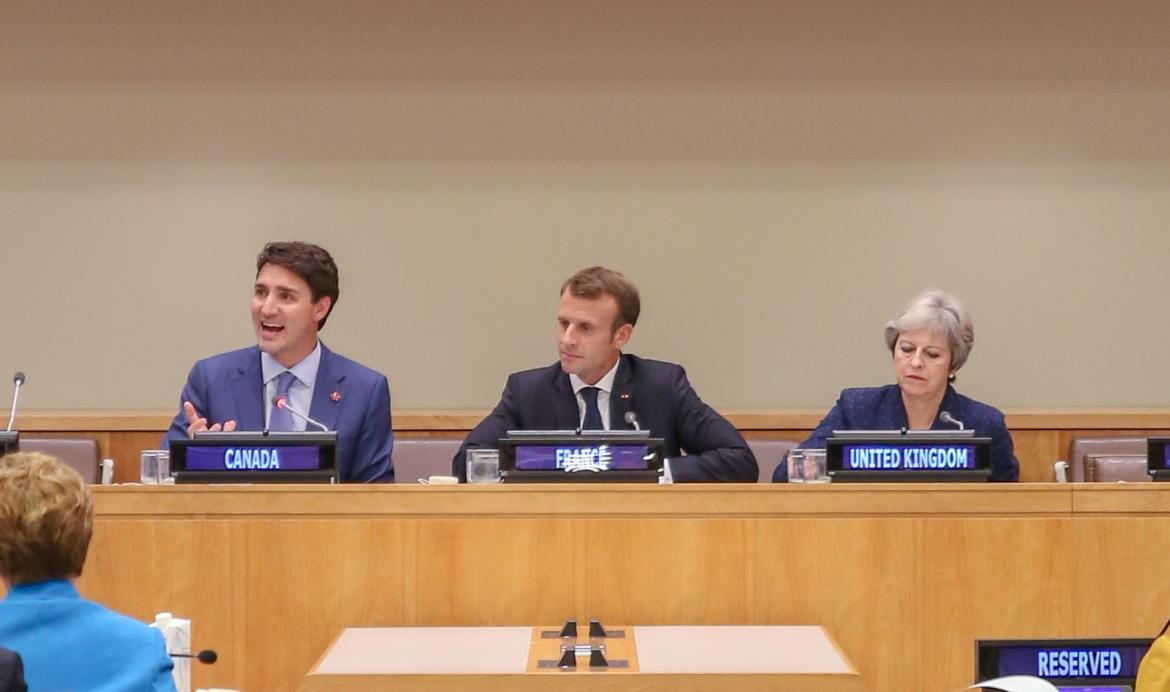Almost a year ago to the day, many of us at the Secretariat were wrapping up the largest education financing event ever organized: the GPE Financing Conference, held in Dakar on February 1 and 2, 2018 and hosted by presidents Macky Sall of Senegal and Emmanuel Macron of France, with GPE’s global ambassador Rihanna in attendance.
The extraordinary commitments made at the GPE Financing Conference in Dakar in February 2018 were the start of an eventful year. Let’s review some of the highlights, from additional funding to increased support to girls’ education and new initiatives for better data and knowledge.


The incredible dynamism, political will and formidable support for education that were demonstrated at the conference gave all GPE partners a boost to continue to put education first in the months that followed.
Partners all around the globe —developing countries governments, donors, civil society organizations, private sector actors— are prioritizing education and taking steps to ensure that more children are able to go to school and learn.
Let's take a look at some of the important milestones for GPE since the Financing Conference:
-
More than US$430 million allocated in grants: Over the course of 2018, the GPE Board approved grants to help partner countries implement their education sector plans, with the ultimate goal to improve children's learning. Grants were approved for Afghanistan, Bangladesh, Bhutan, Cabo Verde, Cambodia, the Central African Republic, Chad, Comoros, Cote d'Ivoire, The Gambia, Guinea Bissau, Madagascar, Myanmar, Sierra Leone, Somalia (Federal government and Somaliland), South Sudan and Zimbabwe.
Most of these countries have identified specific targets in learning, equity and efficiency, against which 30% of the grants will be disbursed. The total grant amount includes US$45 million in accelerated funding for countries facing crisis.
Moreover, grants from the GPE Multiplier have catalyzed additional external funding in support of national education priorities, exceeding the set ratio of US$3 dollars leveraged for every dollar from GPE. To date, close to US$100 million in GPE Multiplier grants have been allocated, leveraging US$440 million in additional funding from bilateral donors, multilateral and regional development banks.
-
US$250 million in additional financing to GPE: Since the combined pledge of US$2.3 billion made by donors in Dakar for the period 2018-2020, additional contributions were announced by Denmark, Germany, the Netherlands and the United States.
The Netherlands announced a new contribution of 100 million euros in support of GPE last September at a high level event at the United Nations.
Denmark pledged an additional 32 million Danish Kroner, equivalent to about US$5 million, a 50% increase from its previous contribution to GPE. Denmark is now the 5th largest donor to GPE.
Germany announced an increased contribution of 28 million euros for 2019, bringing the total for that year alone to 37 million euros. Germany had already doubled its 2018 contribution.
The United States Congress approved an additional contribution of US$87.5 million to GPE, on top of the US$75 million pledged in Dakar.
-
Prioritizing girls' education: On the margins of the UN General Assembly last year, Prime Minister Trudeau (Canada), President Macron (France) and Prime Minister May (United Kingdom) re-committed to finding ways to break down the barriers to girls' education.
GPE continued to promote gender equality at all levels of education systems, convening with UNGEI the third workshop on the guidelines for gender-responsive education sector planning in Togo.

-
Finding solutions to the data challenge: The Education Data Solutions Roundtable was launched in Dakar on February 1st, 2018. It aims to leverage partners' expertise, in particular from the business community, and improve the availability and use of accurate and timely education data. The members of the roundtable met in person twice already. Now, a year later, some of its members find themselves on a field visit to The Gambia, the second such visit in two weeks after Ethiopia. The group is meeting with school directors and local and national officials to get a better understanding of the education data challenge in a national context. The visits will inform concrete proposals by the roundtable to be presented in June.
-
Developing two new mechanisms for knowledge sharing and advocacy: GPE Secretariat teams, along with many partners, have been hard at work over the past months in developing two new funding mechanisms: the Knowledge and Innovation Exchange (KIX) and the Advocacy and Social Accountability (ASA). Once launched later this year, they will give GPE the tools it needs to ensure that partner countries have the resources they need to respond to specific challenges, and to promote more transparency and accountability in the education sector through funding of civil society.
2018 was a crossroads year for GPE, increasing political and financial commitments to education, multiplying linkages with other sectors and stakeholders and consolidating its convening power.
2019 is already shaping up with a continued global attention on education. Key moments this year include the Women's Deliver Conference in June, with a GPE-led series of side events on girls' education, and the G7 Summit led by France, which has put education squarely on the agenda as part of its focus on reducing inequality.
We hope for many more exciting moments and accomplishments this year on the path to reaching SDG 4.